Stories with no ceiling
Homelessness in London from the voices of the unheardEduardo Zamorano
During the last 6 months, the journalist Eduardo Zamorano has immersed himself in a reality that is sometimes forgotten and does not occupy much space in the mainstream news. He has spent time listening to the stories of London’s homeless and people who had no choice but to spend some of the coldest nights sleeping in a tent among the perils of one of the most bustling cities in the world. In the effort of exploring the phenomenon of homelessness from his own eyes, he has connected with a number of charities, religious organisations as well as volunteers, carers and politicians who may have witnessed homelessness from a close perspective and dedicated their lives to help put an end to this phenomenon.
These are the stories of Speedy, Metal, Chris Allen, who, heroes who at some points of their lives, lost their houses. But these are also the stories of Steven, Cheryl, Sister Helen or Wendy who, as part of their work in their organizations (FOELH, BCS or The Big Issue), fight every day to tackle homelessness in London.
What can we learn from their stories?
‘The most difficult part of becoming homeless is to keep sanity. I became homeless 12 years ago, and even though my current situation is considerably more favourable, I will never forget some of the worst things humans can ever witness’.
Speedy
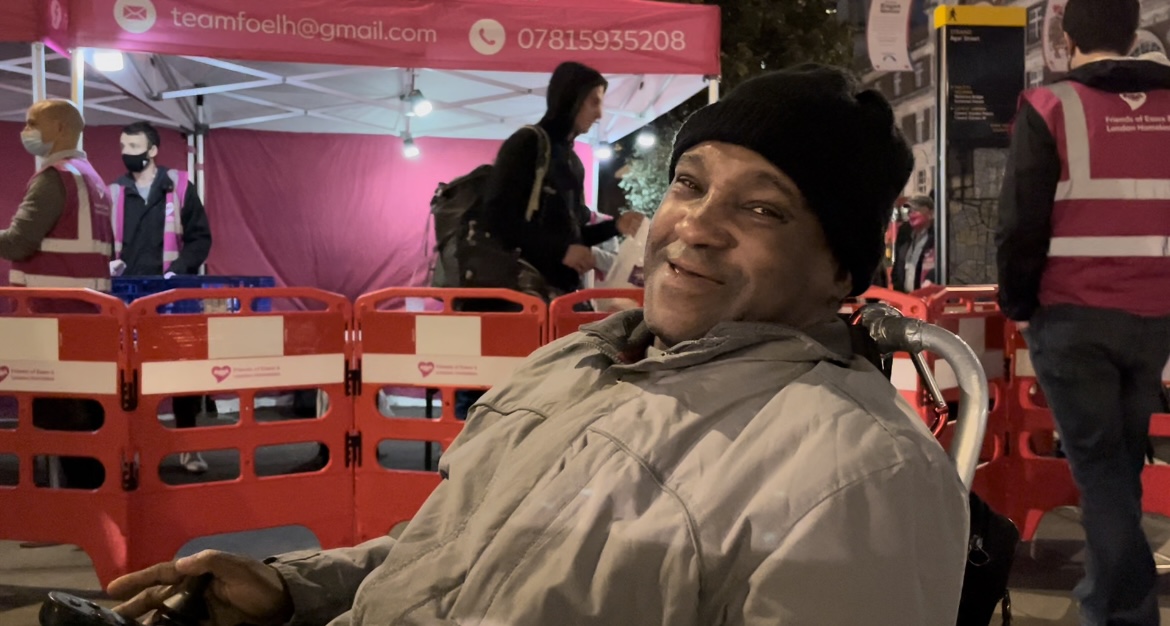
Speedy, smiling at the camera at the food bank on The Strand, London
‘I had a stroke when I was 50, I lost my job, and my house, but not my hope’
My nickname is Speedy, and I was born in the United Kingdom.
Since I was young, I had a mobility disability as well as a hearing deficiency, which has forced me to not be fully independent. But nothing stopped me, and I managed to keep my life as normal as possible.
Throughout my life, due to my disability condition, I have always been forced to rely, to a greater or lesser extent, on medications and caregivers.
I used to work as a mental health assistant in the NHS. A really fascinating job, which also allowed me to be financially independent and have my own room.
However, 8 years ago I suffered a stroke, which left me in a critical situation. As a consequence, my health condition and my disability condition considerably worsened. I was unable to keep my NHS job and was therefore forced to rely on government support.
Despite the fact that the government financed my wheelchair, which is worth £4,000, I did not receive enough funds to cover all my needs and I had to fight for it. Sometimes they would provide me with enough funds for what a non-disabled person would need, but I could not afford some other essential needs that a disabled person requires.
Life being homeless is difficult, especially if you have to sleep on the street. But being homeless with a disability makes the situation even more delicate and sometimes critical. And people sometimes forget. When you live in the street, you naturally become more vulnerable to diseases, due to their fast spread, as well as the extreme weather conditions of cold during winter. Your immune system is certainly weaker given the lack of adequate nutrition and hydration.
Furthermore, after the outbreak of the COVID-19 pandemic, the situation became more uncertain for the homeless: The NHS provided only online services, and many of us did not have an acceptable access to internet. I personally struggled with this situation, as I often needed personal assistance, and the queues at hospitals and health centres were notoriously long. Everything became more bureaucratised and sometimes I did not get the adequate assistance until after a long time, even regarding urgent matters.
Even though I was provided with less than what I needed to live a decent life, I was able to cope and adapt to the adversities. I will always be very grateful for the help I received from the public. In general terms, I consider that I have been very lucky with people who helped me in daily life situations, such as reaching certain products in a supermarket, going up a ramp or simply crossing the street.
After many years living in different temporary accommodations, the government provided me with a house, where I currently live. However, before I reached this point, I have received several hosting offers that I have declined for various reasons. Some of them were difficult for me to access, were dangerous given my condition, or were too far from a health centre.
People with disabilities are currently a priority in public housing, but the offers they make do not meet our requirements.
Many people think that being homeless is just living and sleeping on the streets, but the reality is more complex than that. There are many different situations within the spectrum of homelessness. The term homelessness encompasses people sleeping in shelters, temporary homes, hostels… In other words, everyone who does not own a permanent residence.
Although these contexts may not seem as extreme as sleeping rough, they are also incredibly tough.


Photos of the logo of the London Paralympics Games, and a Most Excellent Order of the British Empire medal
In 2012, I received a Most Excellent Order of the British Empire (MBE) after I took part in the Arts Programme during the celebration of the Paralympics Olympic Games of 2012.
I was not photographed at the ceremony since I don’t like recognition. I believe that human beings must act for his good will, not for his recognition.
‘My biggest dream is to live in a really big house. A big house with dozens of rooms, to accommodate everyone who helped me during my life, as well as other people who sleep rough. I could sleep on the couch’
Some statistics
- In 2009, 3179 people were sleeping rough in London 27%
- In 2021, 11,018 people were sleeping rough in London 100%
- 54% of people sleeping rough are white 50%
- 89% of people sleeping rough are men 80%
‘Approximately 714 people sleep rough in the capital on a typical night’
‘253,000 people in England have lived in temporary accommodation during the pandemic – the highest figure for 14 years’
‘1 every 52 people in London are homeless’
%
of people sleeping rough, had been insulted by a member of the public
- 33% of female rough sleepers have experienced sexual violence 30%
- The average age of death in the homeless population is 47, compared with 77 in the non-homeless population 61.03%
- 45% of Brits feel annoyed when homeless people ask them for money 45%
- 1 in three Brits have experienced homelessness or know someone who has 33.33%
Metal

Avatar of Metal that shows an accurate representation of his physical appearance
‘People often forget that over money, time is the most valuable gift we have’
People call me Metal, probably after my numerous earrings and piercings. I was born in London in 1957.
I had a normal life, with a long history and variety of different jobs, from bartender to butcher.
After the death of my mum, my life suddenly twisted, bringing a few disputes with my dad and other family members. The situation at home became terribly unbearable, tensions and arguments with my dad were unfortunately common.
One day, I noticed a job offer in a newspaper, that provided with accommodation in central London. I saw that small section of the newspaper as a great opportunity to escape from the tensions at home.
Luck was not on my side when I attended the interview. The position was already filled. After that, since my last option was to go back home to my dad, I slowly walked into a trap that was difficult to escape from.
I spent several days in search of a stable job offer that would provide me with a home and a new life. However, the situation was challenging, and at times, distressing. My dream of starting a new life away from my fears from home, seemed to fade away. Neither the local council nor the government were able to provide me with a house, while I try to find a stable job.
At some point, I got tempted by certain ‘street activities’, that drove me to a new lifestyle. Some of these street activities included what are called ‘squat parties’. Which are illegal parties that take place at a secret location provided hours before of the event.
I probably had some of the best moments of my youth. For a minute, all my problems disappeared
Meanwhile, I was tangled up in the bureaucracy involved in applying for social housing.
I had to visit all the different departments to get a decent response, in the application process. The government and local council do not help to speed up the process, but they even made it more difficult.
The daily life if you live on the street is not exactly promising. I used to sleep in a sleeping bag under brutal weather conditions. My back ached, followed by every bone in my body.
You can also feel the discrimination of some people who look down on you. Sometimes drunk men at night who are angry or just bored may come up to you and beat you up, sometimes just for fun. I know many people who suffered it and it breaks my heart.
However, the situation now seems to be more dangerous and threatening. At least before, everyone used to take care of everybody, we were like a family. When someone needed help regarding any issue, we all would offer as much as we could.
These days, however, other homeless people seem to be more independent and selfish, with an individual focus rather than a collective one like it used to be.
As the government slowly reduces benefits for the homeless and more people from other countries come to London in search of better opportunities, groups have been formed, sometimes clashing with each other, engaging in fights and threats. Since the number of people sleeping rough is increasing dramatically, people start to rob and beat each other, especially among drug addicts.
Many drug-addicted homeless people beat up other homeless people, stealing clothes and goods to sell for money to buy more drugs. Personally, I don’t think I could survive if I were homeless right now.
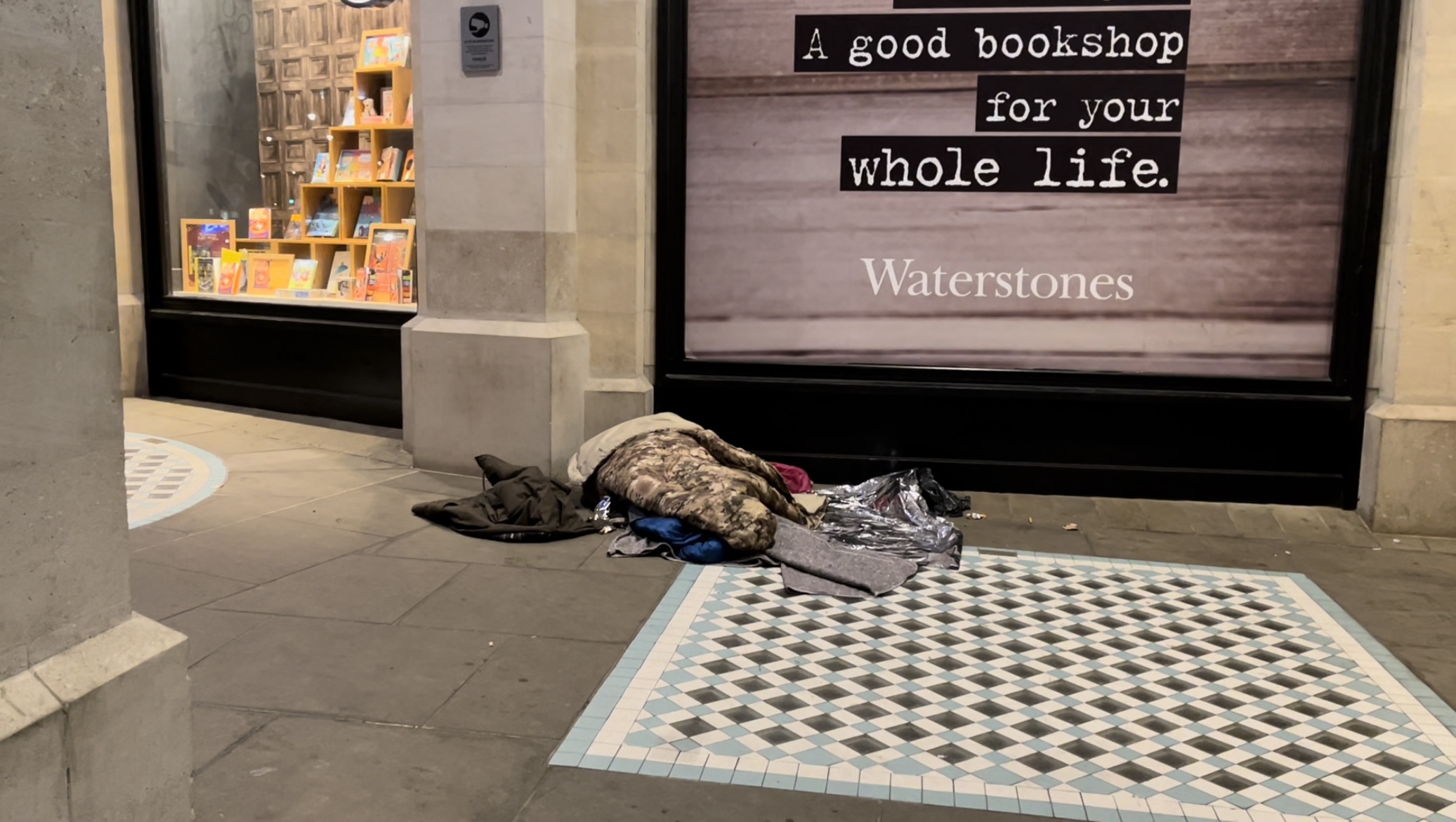
Photo taken the 16th of March in Trafalgar Square. The photo shows a man sleeping in a sleeping bag in the street.
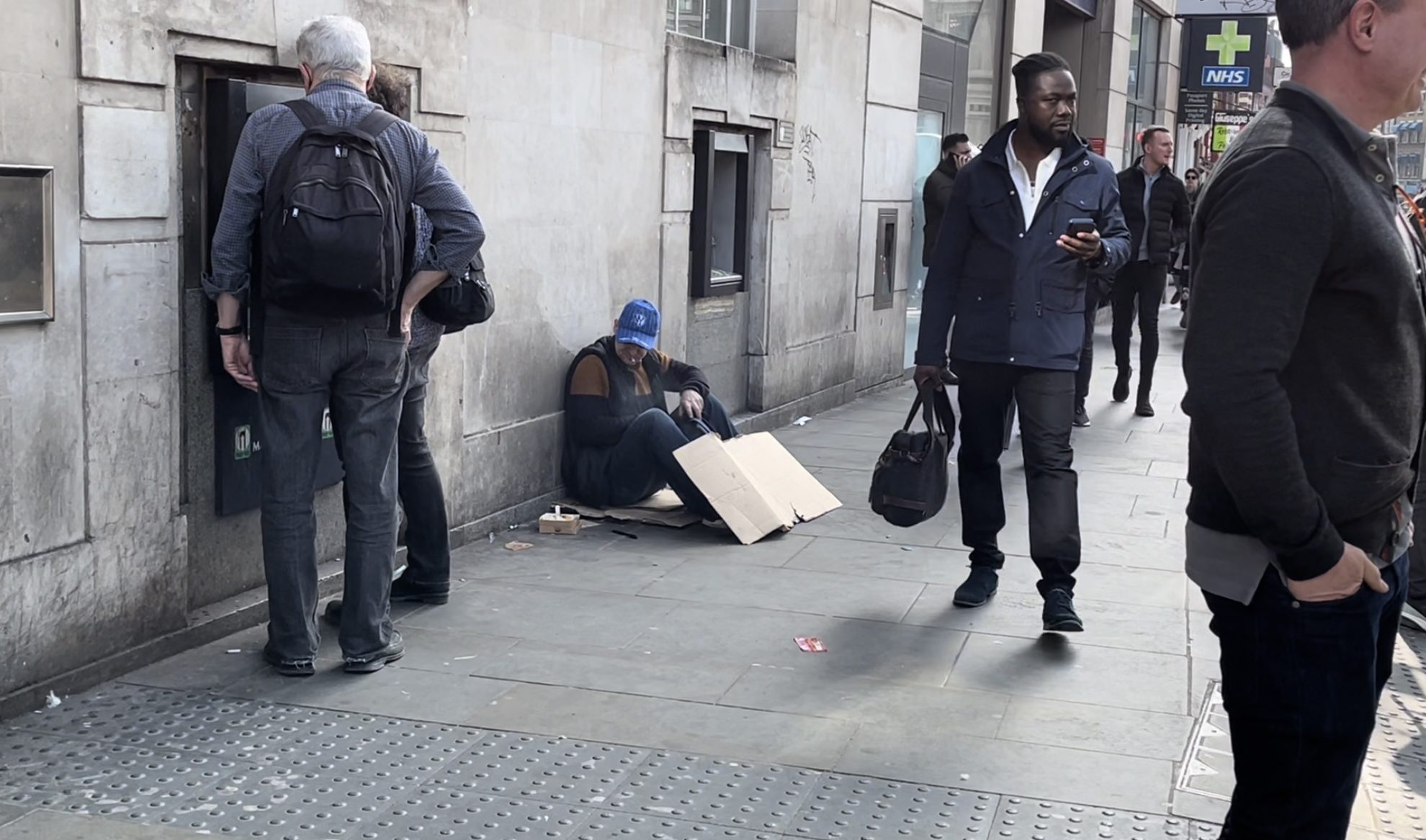
Man sitting on the street and asking for money

Peabody logo
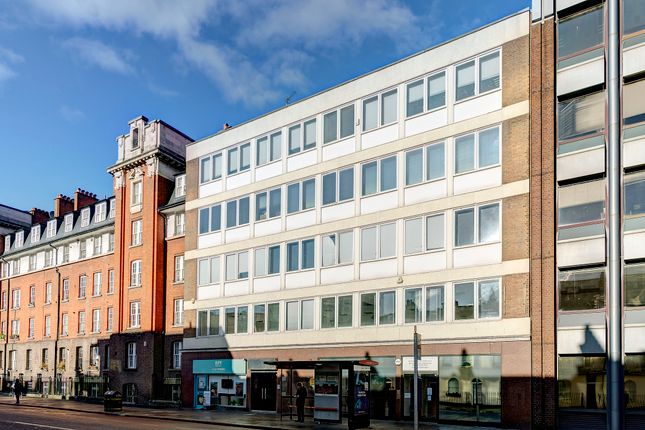
Peabody building on Vauxhall Bridge Road.
One day, after years of struggle, I received an offer of accommodation from Peabody – one of the oldest and largest housing associations in London – through a housing scheme called “Supported Housing”
(You can access the scheme at https://www.peabodyorg.uk/care-and-support/supported-housing).
At first, the plan included assistance with money, food, involvement in the local community, and mental health services. However, my situation was far from that reality. I was sharing a room with 4 other people and sometimes the hot water and electricity would go out for long periods of time.
After years of search, visiting the local authorities on a weekly basis, I found a house that I share with my best friend Shell, who we call ‘Pinkie’, due to the pink colour of her hair.
I currently receive a weekly allowance of £52.89 a week, as part of the Universal Credit Allowance, which is usually not enough to cover my basic needs, specially among the brutal ‘cost of living crisis’.
I visit a range of organisations every week to get food and other goods, so that I can entirely cover my basic needs and, episodically, save money.
You can check the amount of money people may receive based on their circumstances – including income, marital status, whether they have a disability or if they take care of children – by using this link: https://www.gov.uk/universal-credit/what-youll-get

‘Hiding money for others to find’


Metal and other people who were homeless during the last decades, mentioned an interesting, yet controversial initiative that took place in London ‘approximately 10 years ago’. An American ‘philanthropist’ in the US, hid envelopes with cash inside, for people to look for. He carried out the ‘game’ in the English capital, in Hyde Park, one of the most famous parks in central London.
His name is Jason Buzi, a 43-year-old real estate investor from California, who along with a handful of wealthy friends, left tens of thousands of dollars for people to find.
“Some people who find the cash don’t have any and it means a lot, others don’t even need the money and it’s just a bit of fun,” he expressed.
Buzi said he has been overwhelmed by the popularity of the giveaways, but also by people’s generosity. Many of the winners have donated the money to charity, some have used it for good deeds, such as buying someone lunch.
However, many newspapers and public opinion criticised Buzi’s initiative, accusing him of taking advantage of struggling people
‘Housing conditions: the case of Rosemary Wilson’
As Metal mentioned, his time at Peabody was not easy. The poor conditions of the facilities, including hot water and electricity, made it difficult for not only him, but many other people staying in Peabody accommodation.
Other people, like Rosemary Wilson, have also experienced those conditions in this housing association. She shared her experience with the newspapers The Mirror and the Daily Post, where she highlighted the extremely difficult conditions of her flat in north London. ‘Being a 39-year-old mum and living in such conditions, made me want to take my own life’.
She explained how the radiator used to stop working and leaks and water pouring through the wall were habitual.
Her sons’ bedroom was hit by devastating flood damage, which ruined the children’s’ beds, lights, and their possessions. She was forced to sleep on the floor so the children could use her bed.
Originally from Jamaica, Rosemarie has no family in the UK she can turn to for help. ‘I don’t want to move out, but with the conditions I have to move,’ she said.
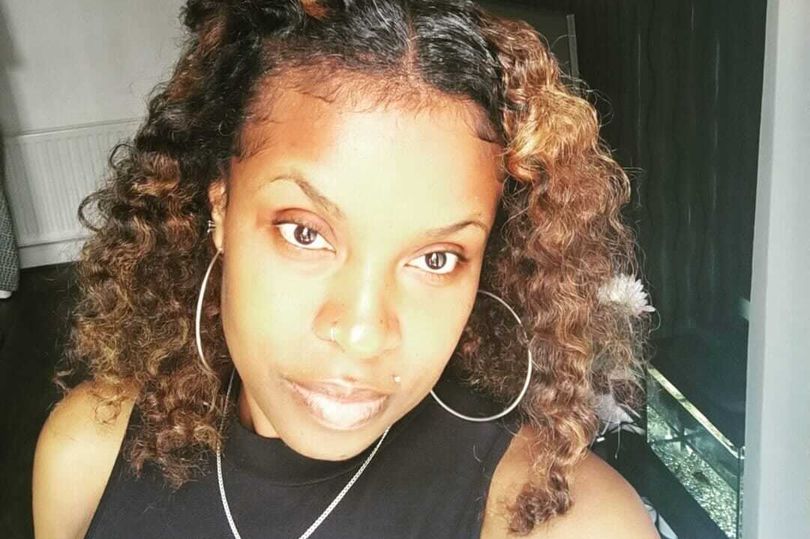
Photo of Rosemary Wilson, in her room at Peabody
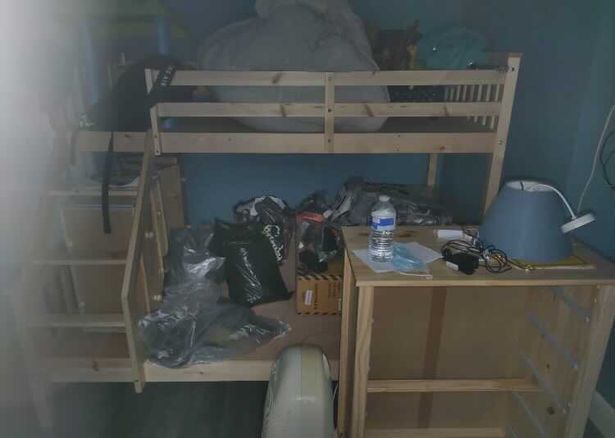
Photos of the condition of Peabody rooms
The Big Issue

A hand up, not a hand out
The Big Issue is a street newspaper founded by John Bird and Gordon Roddick in September 1991 and published in four continents (M. Brown, 2002).
They offer people the opportunity to earn a legitimate income through selling a magazine to the public.
Vendors buy The Big Issue magazine for £1.50 and sell for £3.
Each seller is a micro-entrepreneur who is working, not begging. Therefore, it is vitally important that buyers take their copy of the magazine when they pay for it.
Allen

Avatar of Allen that shows an accurate representation of his physical appearance
‘I´m not begging- I’m working’
My name is Allen and I am currently working for the Big Issue as a vendor.
I became homeless 12 years ago as a result of making ‘some bad decisions’, after the death of my brother. Since then, I struggled to find a stable house in London. Given the fact that I am not a priority for the government, it was not an easy task to find accommodation.
I´ve always worked for my money, never asked for help
The Big Issue provides me with a different option than begging for money. I usually buy 5 magazines at the beginning of the week for £7.50 and sell them for £15, so that I can afford one or two meals a day.
Occasionally, people offer you more money than the price of the magazine, and sometimes, they may even pay the price of the magazine without taking it home.
I believe there is good people in society. ‘A few weeks ago, I was selling the Big Issue outside the tube and a man started asking me about my life. After a quick but nice talk, he handed me 100 pounds. I could not believe it’
However, I could feel the discrimination in many ways, in my daily life: in the bus, in the street, everywhere.
People often look down on you: I would love for people to be in our sleeping bags for a night. You need to sleep in these conditions to deeply understand how it feels.
It is hard to explain the moment when you realise that you have no choice but to sleep that night on the street. You may have made a bad decision, you may have lost your job… but there are no words to define the first night sleeping rough.
Furthermore, the government funds more money to people with drug addiction. Drug users can apply for the Employment and Support Allowance (ESA) in addition to the Universal Credit – which often leads homeless people to become drug users.
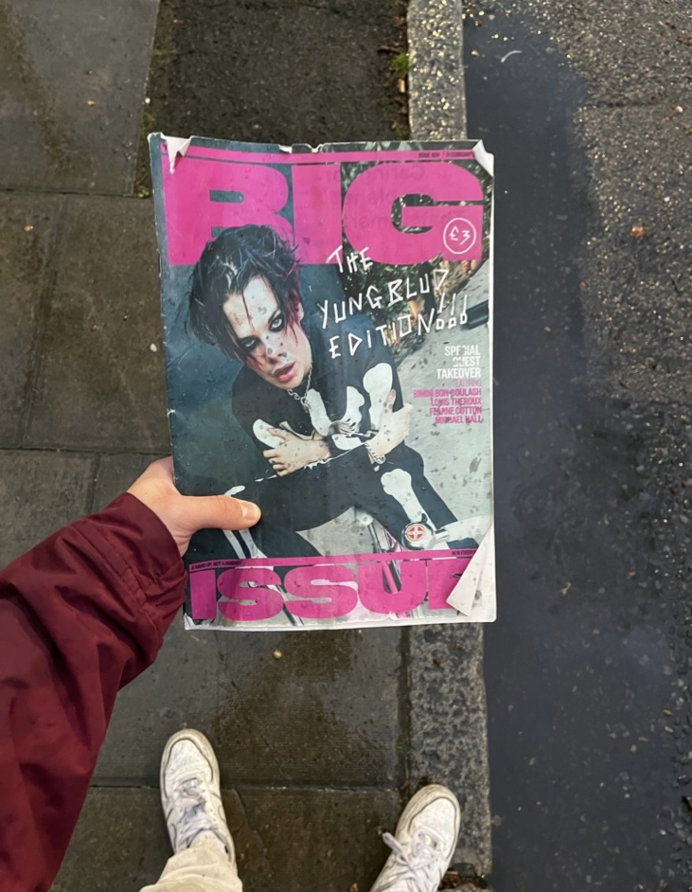
Last edition of the Big Issue magazine that Allen was selling, and I bought.
Employment and Support Allowance (ESA)
You can apply for Employment and Support Allowance (ESA) if you are under State Pension age and you have a disability or health condition that affects how much you can work.
You also need to have both:
- worked as an employee or have been self-employed
- paid enough National Insurance contributions, usually in the last 2 to 3 years - National Insurance credits also count
If you use drugs and/or alcohol problematically you will have to show how this, along with any other conditions, affects you being able to work.
Personal Independent Payment (PIP)
Personal Independence Payment (PIP) can help with extra living costs if you have both:
-
a long-term physical or mental health condition or disability
-
difficulty doing certain everyday tasks or getting around because of your condition
You can get PIP even if you’re working, have savings or are getting most other benefits.
If you use drugs and/or alcohol problematically you will have to show how this, and any other health conditions you may have, affects your ability to carry out daily living tasks and how your mobility may also be affected.
Universal Credit
Universal Credit is a payment to help with your living costs. It’s paid monthly - or twice a month for some people in Scotland.
You may be able to get it if you’re on a low income, out of work or you cannot work.
It is a single benefit that combines means-tested support for adults, children and housing costs into a single benefit and is paid once a month.
‘A man set a homeless man on fire to impress a girl’
As both Allen and Metal highlighted, life on the streets can often be a hostile and threatening environment, frequently by members of the public.
In 2019, a 24-year man poured two homeless people with oil and set them on fire in Croydon, to “impress a girl”.
He was called Montel Nowhia-Job and caused “severe psychological damage” to victims Andy Hillerby and Mauricy Malczewski. Their sleeping bags were destroyed along with other important identification documents.
The victim stated he awoke as he felt hot on his head. He looked at his clothes which were on fire, he could smell smoke and he could see sparks coming from his head.
‘He tried to extinguish the fire by patting his head with his left hand, causing burns.’ The victims stated for the Daily Mail.
Montel Nowhia-Job was charged with arson and attempted grievous bodily harm.
(You can access this news at: https://www.dailymail.co.uk/news/article-7138123/Police-arrest-man-teen-two-homeless-people-set-FIRE.html.)

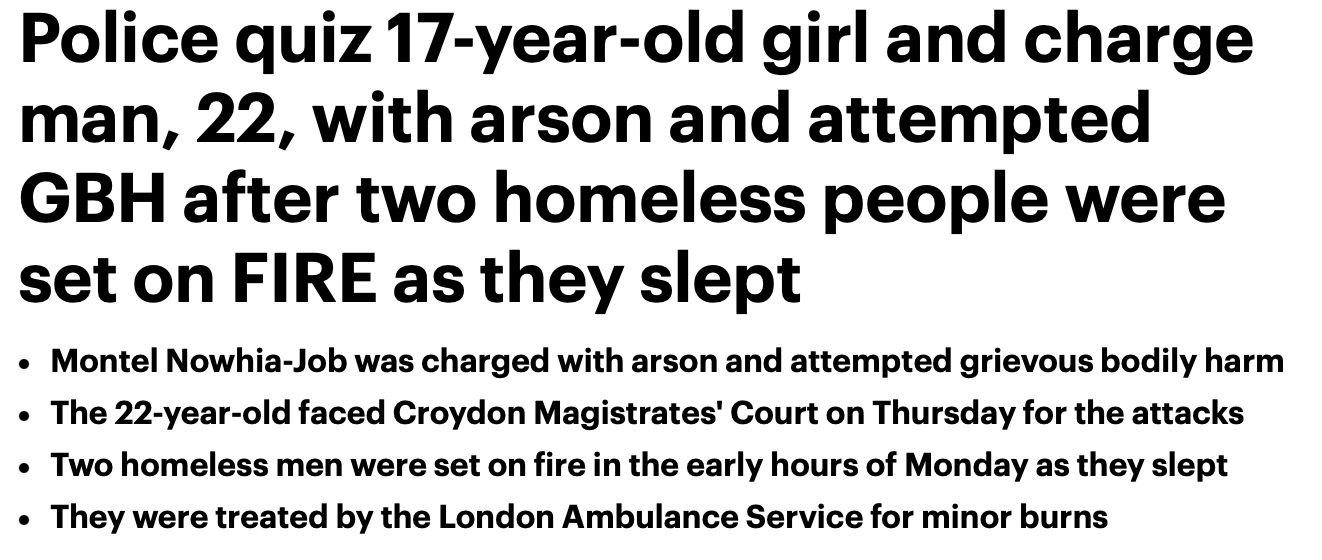
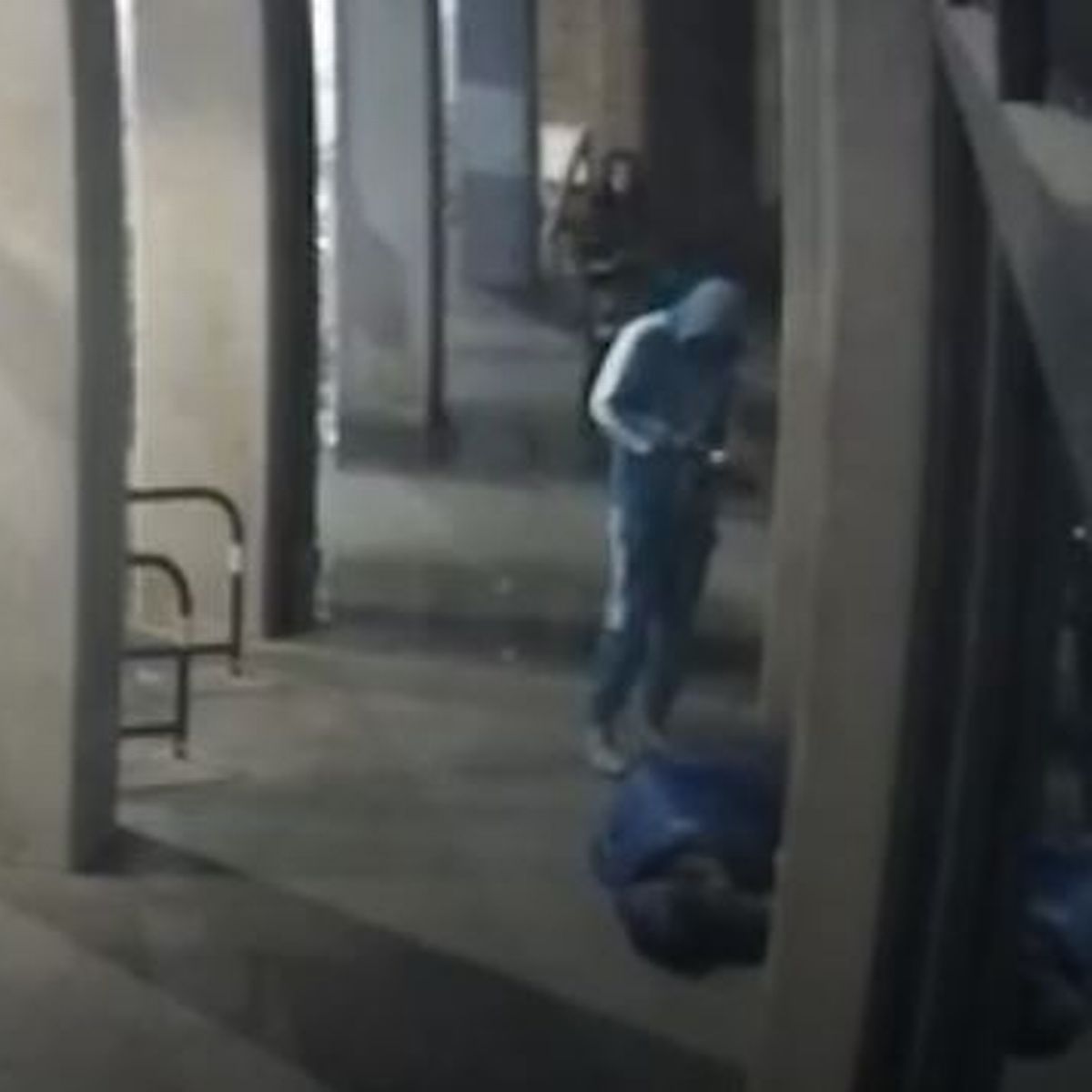
Photo of Montel Nowhia-Job before setting fire to a man sleeping on the street in Croydon, South London.
Chris
My name is Chris and at the age of 61, I lost my job and became homeless.
My first wife died 20 years ago, but fortunately I could continue with my stable life and my job.
I used to work 7 days a week, 12-hour shift for two and a half years, without a day off. Working long hours, earning £35.60 an hour.
During the pandemic, the company I worked for began to fall apart financially, and therefore my situation became critical: First, everyone at my company was requested to work part time, and eventually most of us lost our jobs. In my case, I was unable to get help from any of my family members, as they all live abroad: Canada, the United States, and Australia.

Avatar of Chris that shows an accurate representation of his physical appearance
‘One day I was walking with my wife, and I gave a few pennies to a young homeless man. My wife told me not to do it. I said to her: ‘You never know if you may become homeless one day’
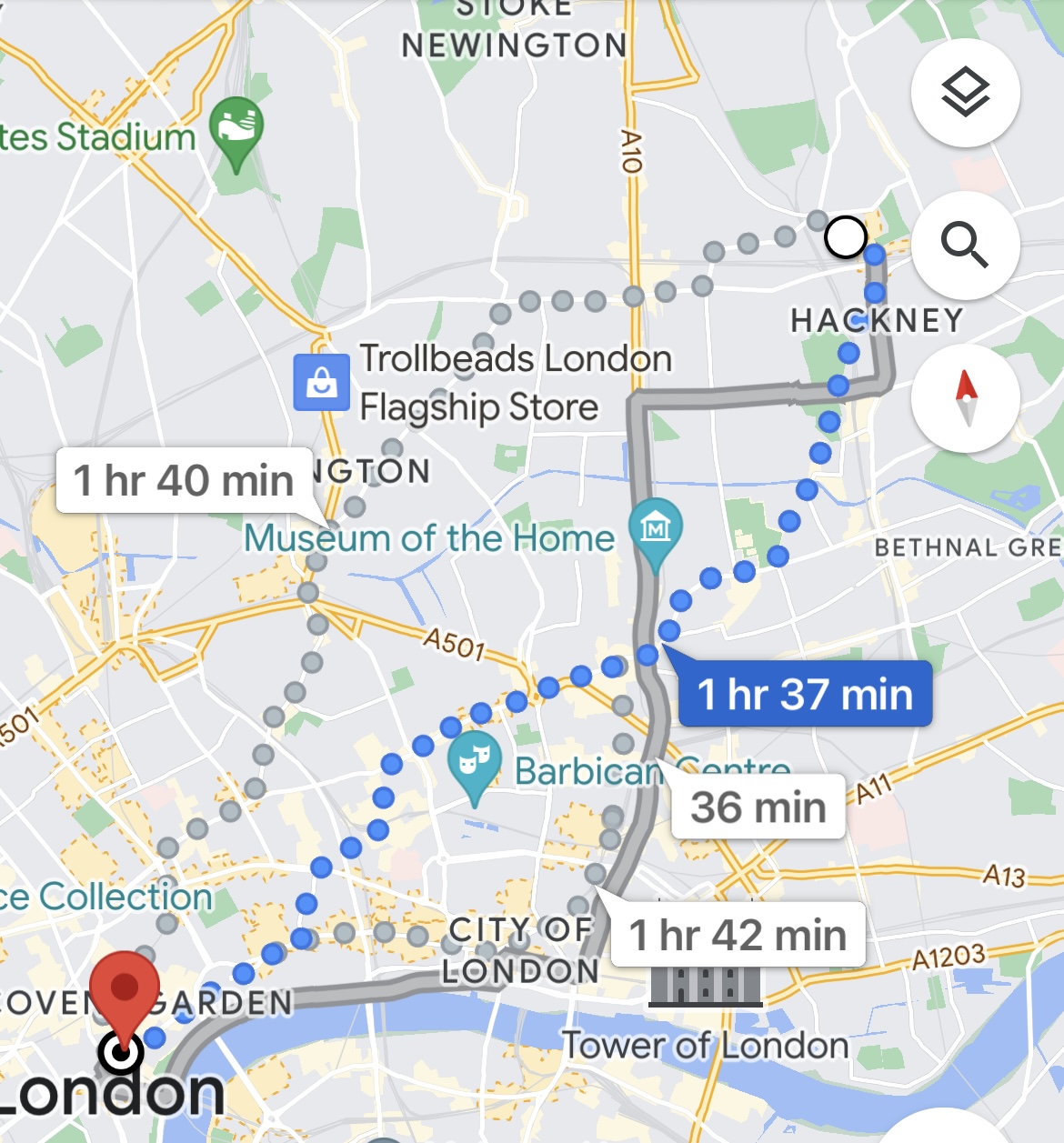
Route that Chris have to walk twice a week to get food from Friends of Essex and London Homeless.
Moreover, my wife and I got divorced and she requested me to pay the bills for the house she bought for them [her husband and their children]. I urged her to give me 9 months to find a job and pay for it, but instead I was blacklisted and had no choice but to become homeless.
When I became homeless a year and a half ago, I said to myself, ‘There is no way I will end up on the street.’ So, I fought to get temporary accommodation, social housing or a room in hostels.
However, for three months I could not find anything, and I had no option but to live on the streets. After 3 months of sleeping rough in the street, I obtained an offer of accommodation in Hackney, Northeast London.
I currently have access to Universal Credit, but until one month ago, I could not even afford a monthly bus pass.
I had to walk all the way from Hackney to Charing Cross to pick up my food from FOELH, twice a week, at my age of 63
‘My biggest dream, is to wake up one day with magnificient views of the sea, in the most remote place on earth’
Friends of Essex and London Homeless (FOELH)
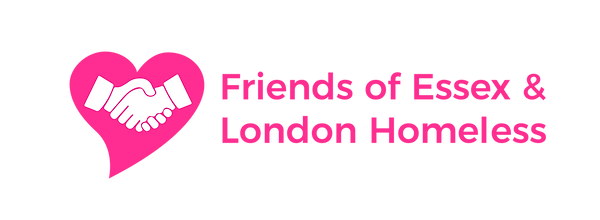
Friends of Essex & London Homeless (FOELH) is a homeless charity that started in December 2016 by Steven Stuart and Cheryl and have grown to 30+ volunteers.
It became a registered charity (1178366) in May 2018. It is not a funded charity, and it relies entirely on donations from their followers on Facebook, Twitter, Instagram, LinkedIn, and their website (https://www.foelh.com).
They provide food for homeless people in Essex and London. Every Wednesday from 5:00 p.m. to 7:00 p.m. they arrive in their van with volunteers who help deliver food to almost two hundred people.
‘We run two soup kitchens every week without fail. Charing Cross every Wednesday night delivering over 180 hot meals, sandwiches, cakes, drinks, soups, toiletries, clothing and sleeping bags etc. and Friday nights at Grays handing out up to 40+ hot dinners’ – Steven explained – ‘We have an Amazon Wish List on our website and on Facebook where people can choose what they donate to us. We treat everyone we meet with dignity and respect and never judge as we don’t walk in their shoes’
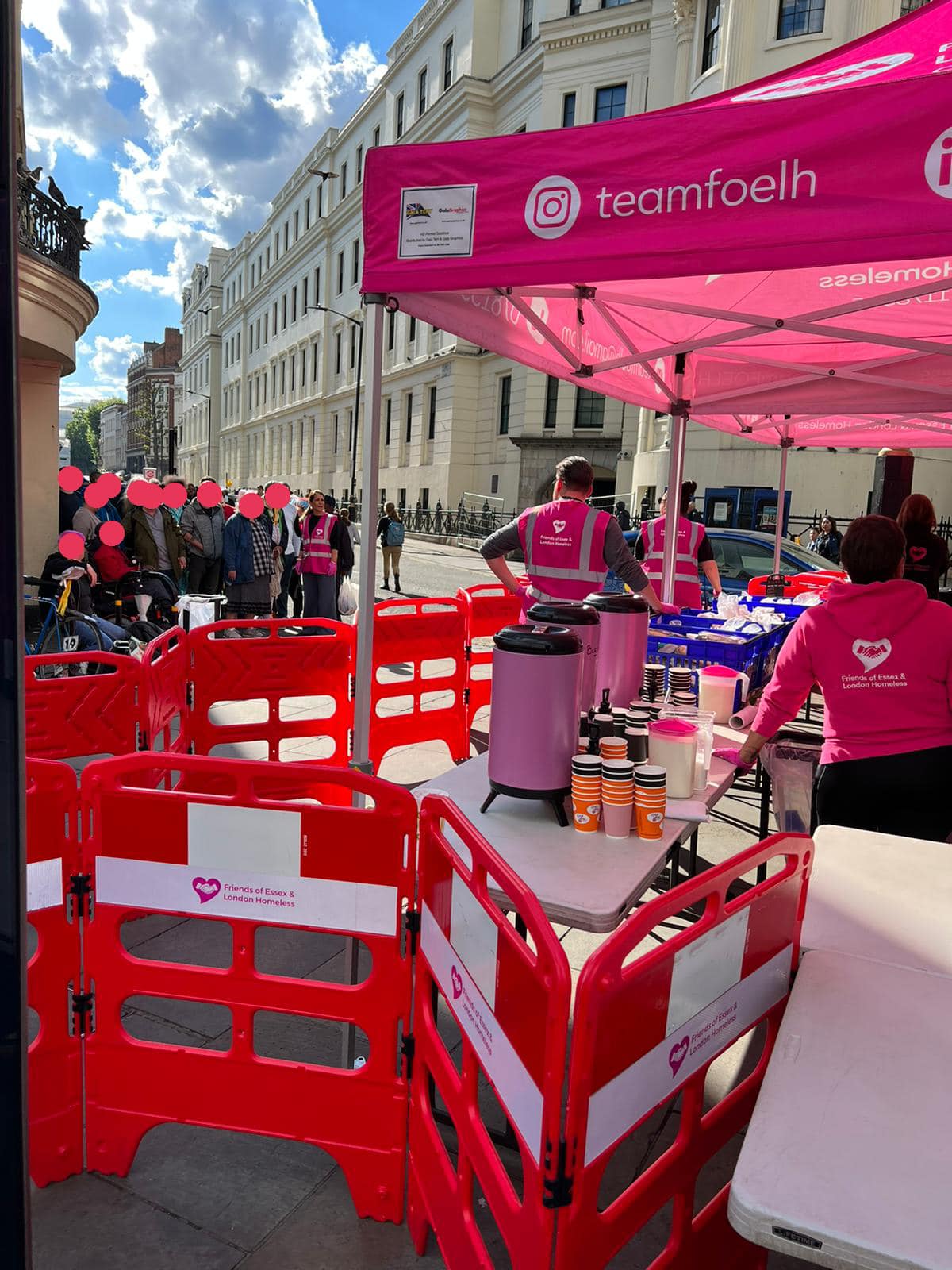
FOELH food bank on The Strand
They are a committed small charity whose goals are to make a difference by reaching out to those in need at their weekly soup kitchens in London & Essex as well as trying to help those less fortunate with some kindness and words of encouragement with the hope of signposting and forwarding to other services to assist with further help in their rehabilitation to a better future.
One afternoon in mid-March 2022, the van where they bring the food from Essex kitchens broke down, and thus, they could not provide the service in The Strand.
Since they are a non-funded charity that just rely on donations and neither the government nor the local authorities seem to be eager to contribute. They tried to raise funds to either fix their van or, in the worst-case scenario, buy a new one. Steven, the chairman of the charity, stated how ‘the only option to provide food to our homeless friend is paying to hire a vehicle that is not cheap’
‘We make applications each day and week and for every 100+ we may get lucky’
If you would like to contribute, visit this link. Every little help is more than welcome:
https://www.paypal.com/paypalme/teamfoelh
On April 14 they announced on their Facebook profile that the van was finally ‘up and running’, thanking everyone who donated and especially Grays Service Station who helped to fix it.
Fortunately, they are now able to provide their weekly service as usual.
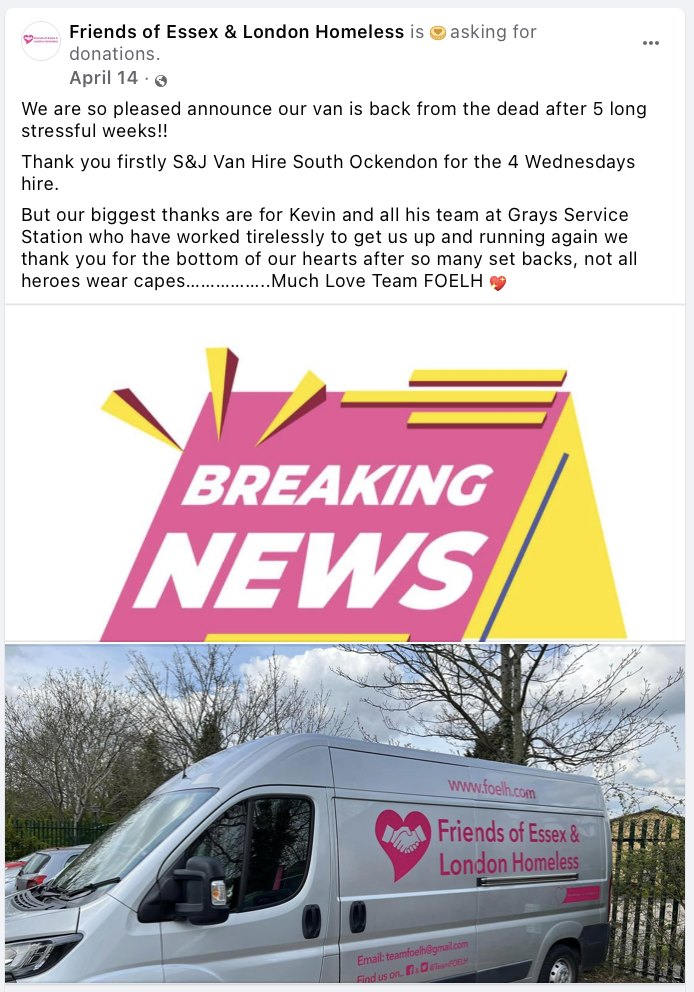
FOELH post on Facebook announcing that the van had been repaired
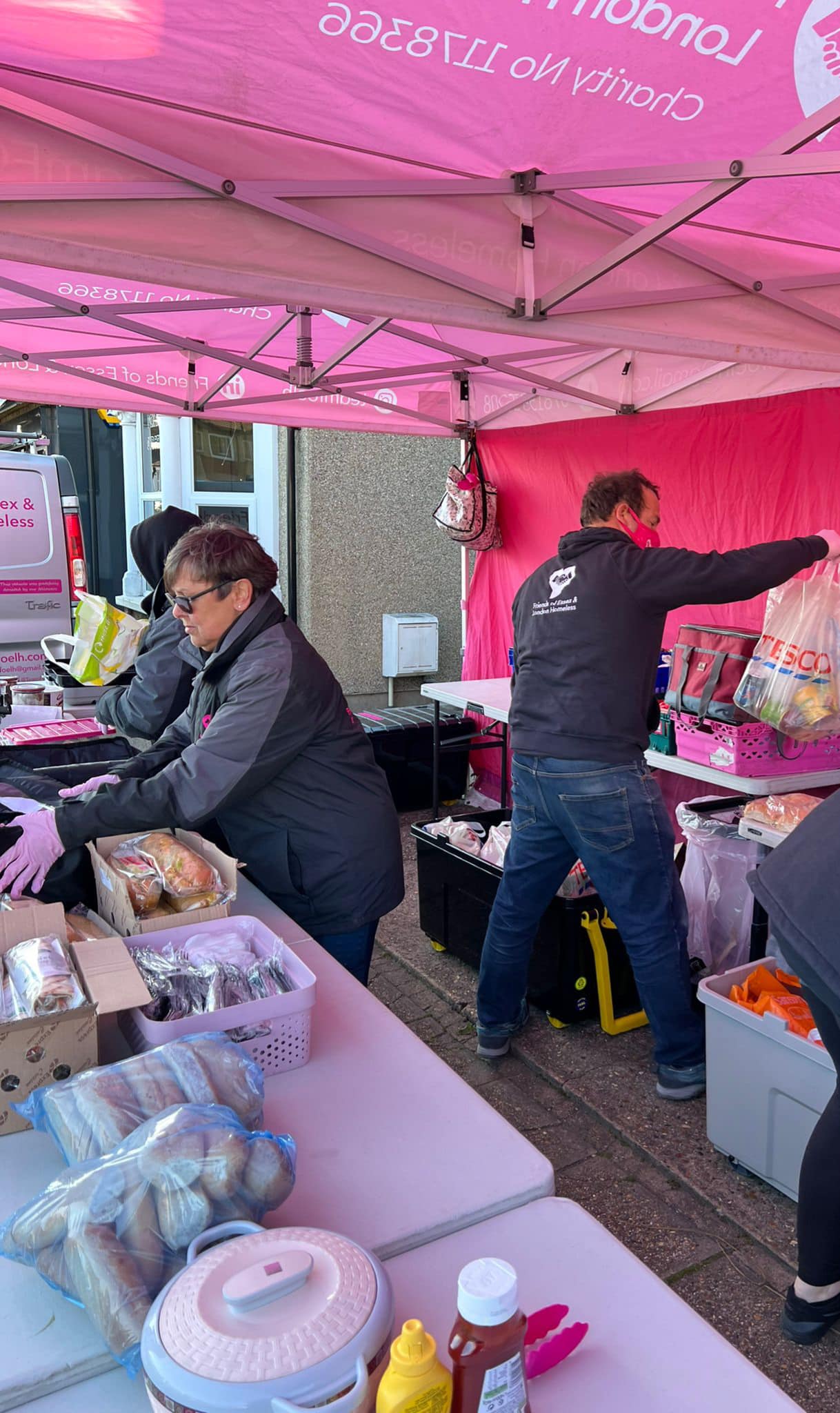
FOELH volunteers distributing food in the food handout
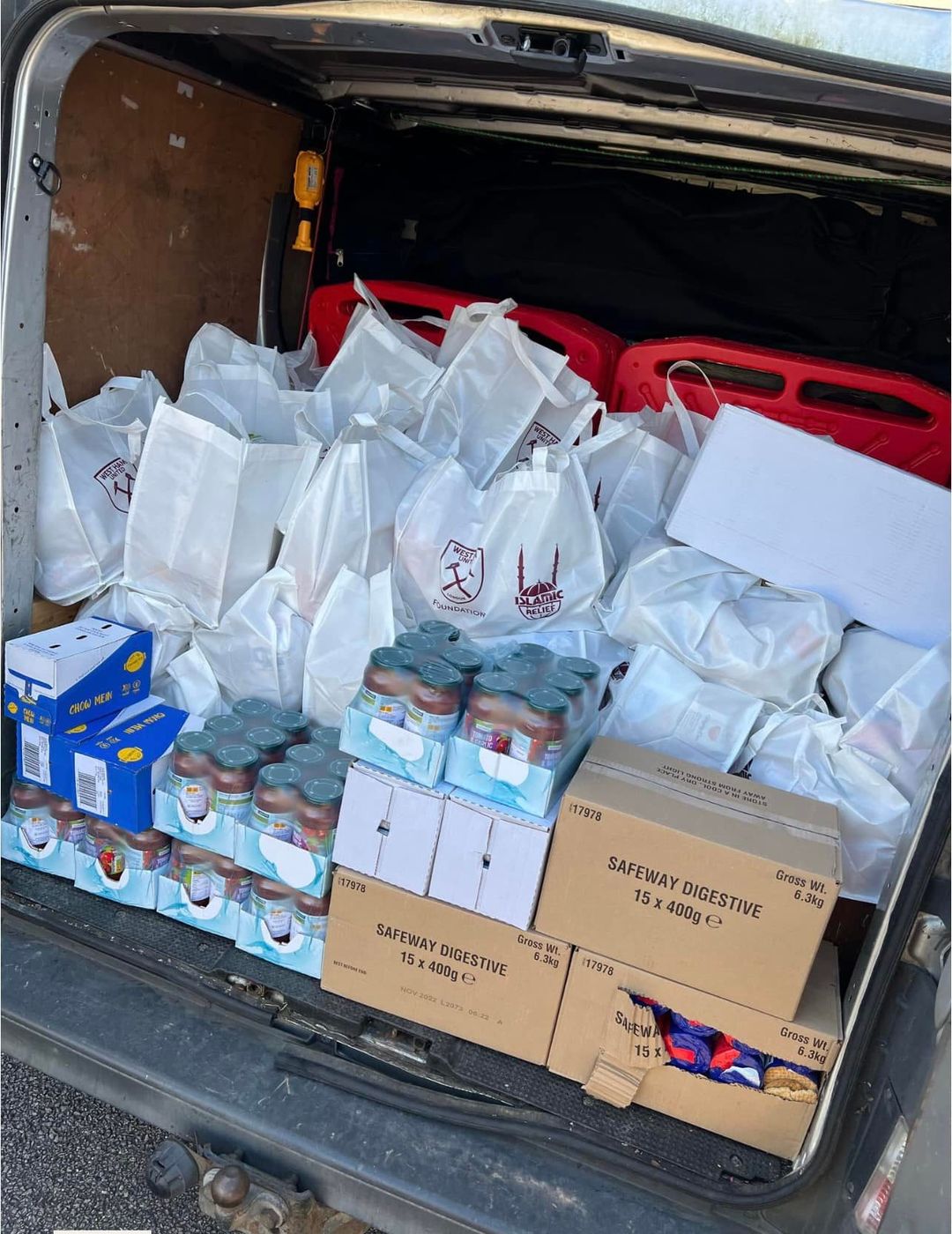
FOELH van full of stacked food bags for the homeless
Brotherhood of the Cross and Star

Brotherhood of the Cross and Star (BCS) is a religious charity registered with the Charity Commission, that is involved in a variety of charitable activities which reflect their mission to promote and demonstrate practical Christianity. The Fellowship in the UK as well as members of different pews, regularly donate food to community food banks, as well as providing clothing and toiletries to homeless charities that run shelters and day centres. Members also actively engage with the homeless on the streets of London and Manchester by providing hot cooked meals, visiting hospitals, hospices, nursing homes and antenatal units and offering prayers and donations. As BCS is a non-funded charity, they do not receive any financial compensation from the government.
Sister Helen Barlett, sister of the Brotherhood of the Cross and Star, helps manage the bi-weekly food distribution in Falmouth Road and Charing Cross.
‘The food is made by our volunteers. We provide the best possible hot food to everyone who may need it. Everything is bought and cooked in the same day, as fresh as possible. We offer what we would like to eat ourselves’ – Sister Helen explained.
For four decades they have been helping thousands of people from different nationalities, age, gender, and race. ‘We have the responsibility to do it. If we don’t do it, nobody will, and people need help’ she highlighted.
However, over the last few years, especially during the pandemic, she has noticed a significant increase in homeless people who need food on a daily basis.
‘During the pandemic, numerous people lost their jobs, which led to them also losing their homes. Pregnant women, people with children, people with disabilities, were left in situations of great difficulty. In addition, inflation, as well as the housing and cost-of-living crisis, have profoundly influenced housing and food prices, forcing many citizens to live in precarious conditions.’ she explained. ‘Even people with jobs have been forced to look for a second job in order to afford a decent house.’
However, there is still a place for hope. After the pandemic, Sister Helen has noticed that society has become more united and aware of inequalities.
‘I believe that the difficult times that we have all gone through with horror and fear have kindled a flame of empathy among the population. More people are starting to donate and share anything they don’t need. People aren’t judging as much as they used to, and good people are coming together,’ she added. ‘London is such a diverse city where everyone is more than welcome, without prejudice.’
After 40 years, since they set up the food bank in London, Sister Helen has encountered a rich range of stories and experiences of the most diverse people from all around the world. ‘One of the most fascinating stories is when I brought my own children, decades ago to experience the daily life of homeless people. When we started with the food bank, we used to stay in the old church in Waterloo. By that time, Waterloo was a poor neighbourhood, at times dangerous. I decided to bring my two children so that they could see my work and they could learn from homeless people. My son, that was only 9 years old, was shocked when he witnessed how two men started fighting for food. One of the two men, unfortunately fell down and started bleeding on his head.
‘That shocking situation allowed my son to experience how people can be desperate for food and how we should be thankful for everything we have. Since then, he values every meal he eats and now he teaches his children the same way.’
Sister Helen Barlett, posing in front of the Church in Farlough Street, Elephant and Castle.
Crisis
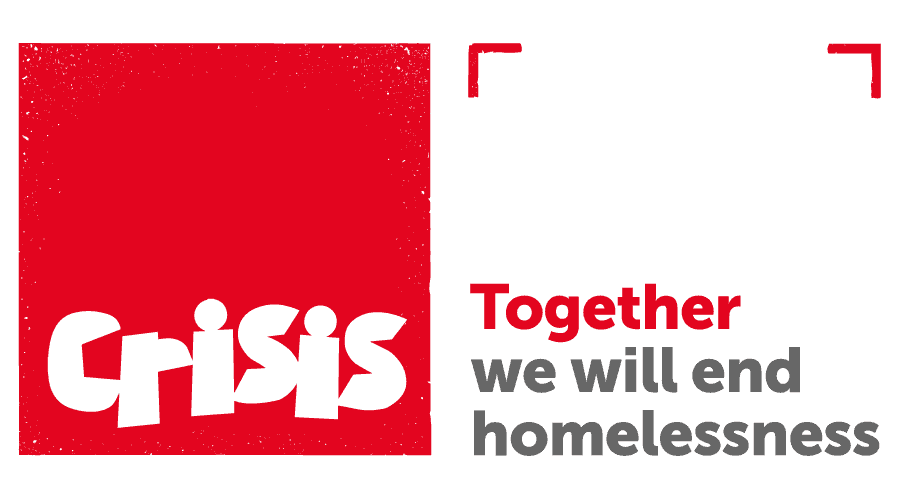
In case you are at risk of becoming homeless or know someone who may do, Crisis will assist you in any way possible
They work side by side with people to help them rebuild their lives. Drawing on decades of experience working with thousands of homeless people, they provide all the tools needed to leave homelessness behind for good.
Wendy Gibson, volunteer in Crisis, highlighted: ‘At Crisis, we provide a range of services to help anyone who is vulnerable, with a focus on people who have become homeless or sleeping rough. They come [to the Skylight Centre] and according to their situation, we assist them signpost and to the corresponding service: accommodation, food, health…’
‘We work with different organisations that provide useful services for people in critical situations,’ she explained.
Listed below are a number of helpful resources if you are homeless or know someone who may be.
Useful sources
Dental services for the Homeless
Kent Community Health Foundation Trust
Hairdressing services for the Homeless
Services for people sleeping rough
Food, showering and advice services for the Homeless
Emergency services
Emergency 999
If you are concerned that harm to yourself or others is occurring or about to occur, call the police and
ambulance services on 999
NHS 111
If you need medical help but it is not an emergency call the NHS on 111
https://111.nhs.uk/
Samaritans
Confidential emotional support 24 hours 7 days a week, call 116 123
https://www.samaritans.org/
Tower Hamlets urgent mental health helpline
for anyone experiencing a mental health crisis call 0800 073 0003
https://www.elft.nhs.uk/service/446/Tower-Hamlets-Mental-Health-Crisis-Line-247
Tower Hamlets Family Assistance
for advice or support for a family, call out of hours emergency team 020 7364 4079
https://www.towerhamlets.gov.uk/lgnl/health
social care/children and family care/Early Help/Wher
e Help aspx
Paprus Hopeline UK
for any young people (under 35) at risk of suicide, call 0800 068 4141, SMS 07860 039967,
email pat@papyrus-uk.org
https://www.papyrus-uk.org/hopelineuk/
CALM Helpline
Open 5pm – midnight, confidential, anonymous, and free support, call 0800 585858
https://www.thecalmzone.net/help/get-help/
Maytree Sanctuary
confidential advice and support to get help, call 020 7263 7070
https://www.maytree.org.uk/im-feeling-suicidal/how-contact-us#block-views-block-header-Image-block-1
SANE Helpline
Leave a message on 07984 967 708 for a call back
http://www.sane.org.uk/what we do/support/helpline/
Soup Kitchens open
Tower Hamlets 7.30pm Sunday. Bethnal Green
Tube Station
Old Street Saturday 1.00pm St Johns Church,
Pitfield Street
Brixton 5.30pm Sunday. Nr Ritzy Cinema
Camden 7.00pm Tuesday. Camden Tube
Station
Archway 6.00pm Wednesday. Archway Tube
Station
Kentish Town 6.00pm Wednesday. Kentish
Town Tube Station
Goodge Street Thursday 5.30pm Goodge Street
Tube Station
Health services for the Homeless
Career couching and clothing for women
Smart works
-Each client receives a bespoke dressing
consultation with two trained volunteers.
-The client will leave with a beautiful and
high-quality interview outfit.
-This is free of charge and the clothes are
hers to keep
-This is followed by a one-to-one coaching
session with an expert interview coach.
confirmed upcoming job interview.
-For those currently job searching
and looking to secure an
interview.
-An hour long coaching session
delivered over zoom or phone call.
-Trained coaches work with clients
to identify tangible next steps to
maximise chances of securing
an interview
My own conclusion
Dealing with people at risk of social exclusion – including homeless people, rough sleepers, refugees or people with disabilities, has not been an easy task. Not because they may be dangerous or threatening, but because of the fact of listening to brilliant people, with great ambitions, that for various reasons, their lives did not go as planned.
Stereotypes and prejudices often create a distance between homeless people and the rest of society.
In contrast, I have come across with talented minds, people with great ambitions, with dreams and hope.
During this time interviewing and exploring the lives of homeless people from a close perspective, I discovered a noticeable tendency among them to take care of one another and make sure the other feels good. Most of them do not see their situation as worryingly or disastrous, as other people may think. They value time above anything else and even criticise the stressful and rushed life of people who work in offices. ‘The people at the top – as they called them – may have money, but they won’t have time to spend it with their loved ones,’ Metal once said.
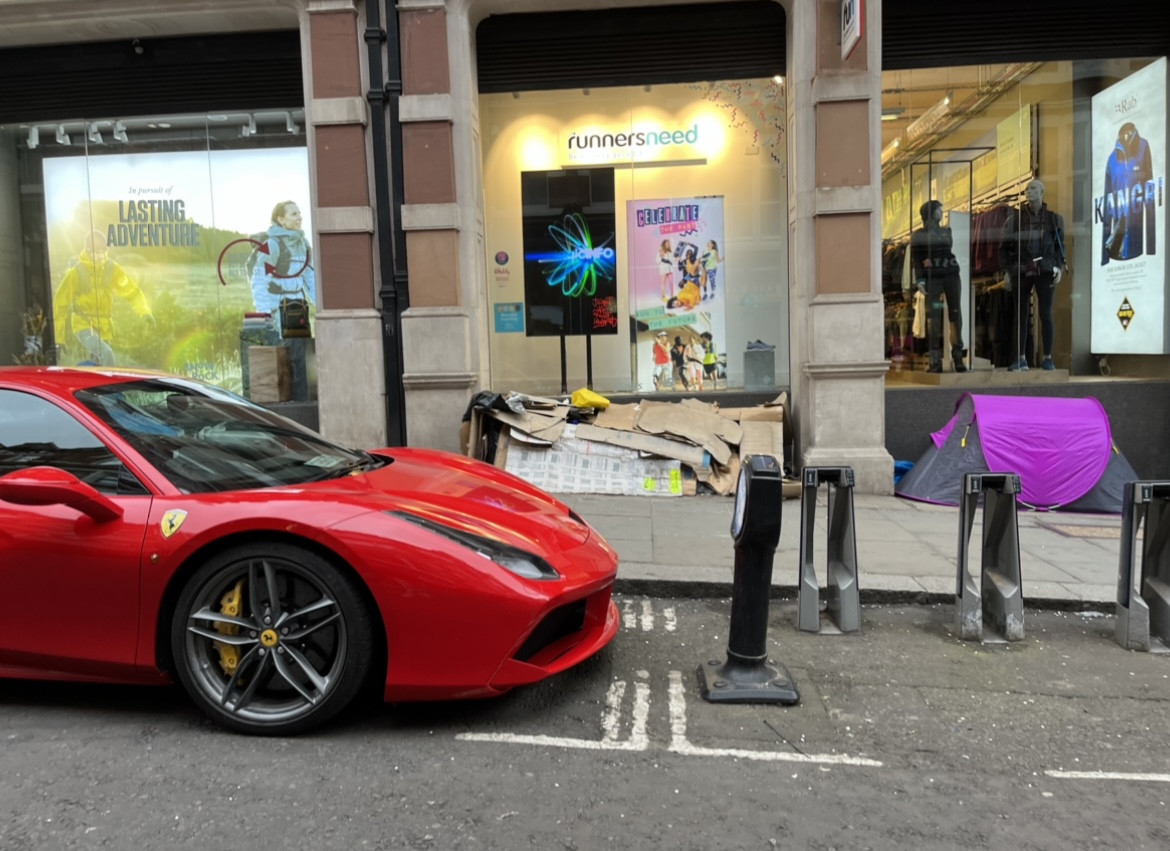
Contrast between a luxurious car and the tents of homeless people.
But not only have I learned more about homelessness, I have also learned about society. I think there is still a lot of hope in society. Friends of Essex and London Homeless, Crisis, Brotherhood of the Cross and Star, Workers for the Big Issue, Allen, Maggie, Metal or Speedy are part of the machinery that allows society to function, without the need for recognition or economic benefit, believing that a better society is easily attainable.
My homeless friends have taught me a great lesson: live in the present, enjoy your life today, which may be cut short tomorrow. Never take anything for granted and be grateful for what you have.
After spending many hours with homeless people, I started to make connections and it became a tradition to see each other, laugh together and talk about our dreams. Just like I may do with friends after university.
With just one difference: they never check the time.
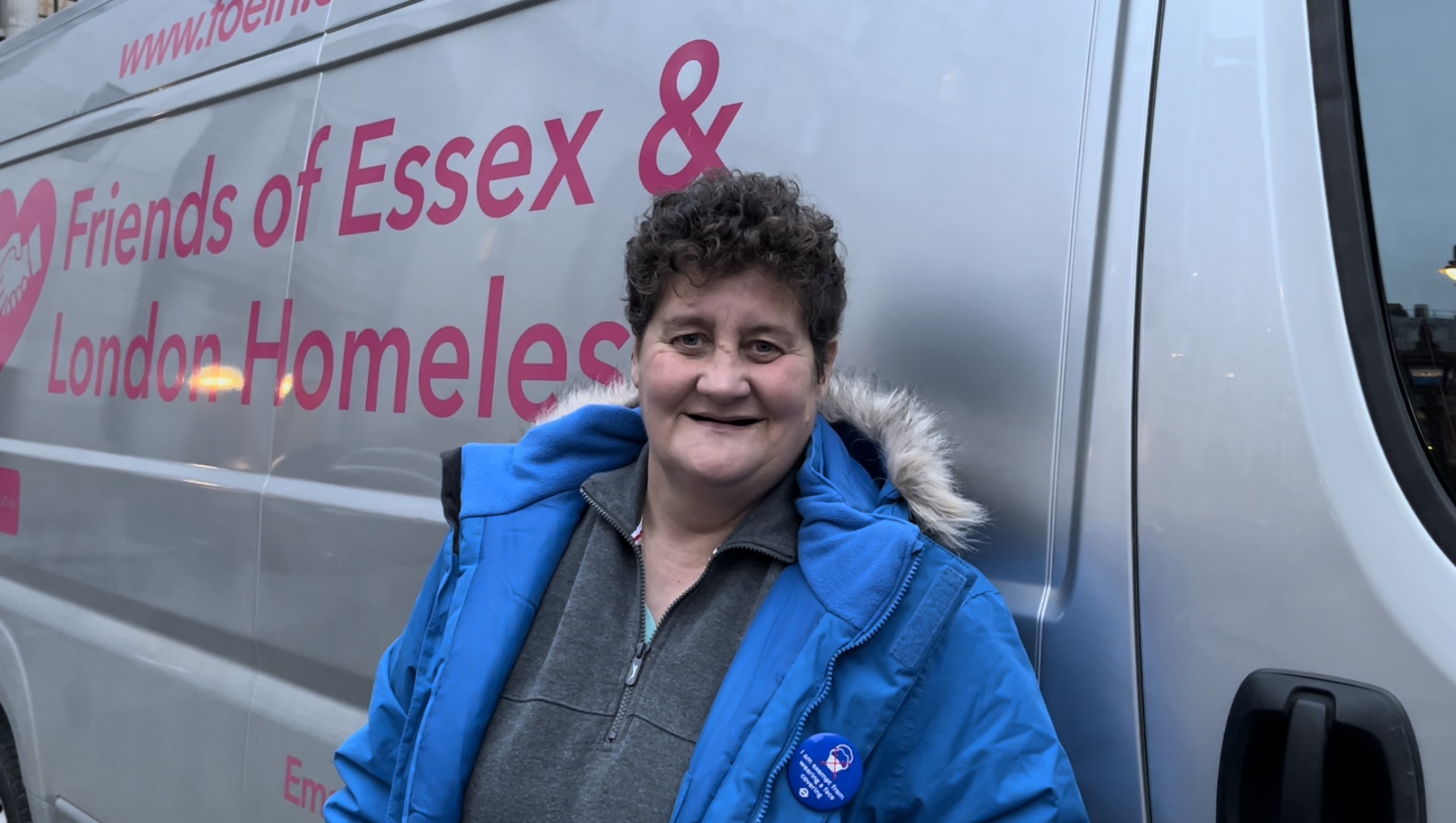
Margaret posing for the camera next to the Friends of Essex and London Homeless van.
In our attempt to record an audio in which Maggie (Margaret, pictured above) would tell her story, she decided to get a little personal and dedicated some beautiful words to me:
Furthermore, a few months ago, Speedy came up with a brilliant idea: ‘Convince the owner of the bar where I was working at, to create two special cocktails in order to raise funds for the homeless in London’. He decided on the recipe and the name of the cocktail: ‘Speedy Cocktail’ and ‘Speedy Gonzales Cocktail (alcoholic version)’.
In this video, Speedy sends a clear message to Alan, the bar owner, by giving a brief introduction of himself and presenting what he believes is a win-win case.
